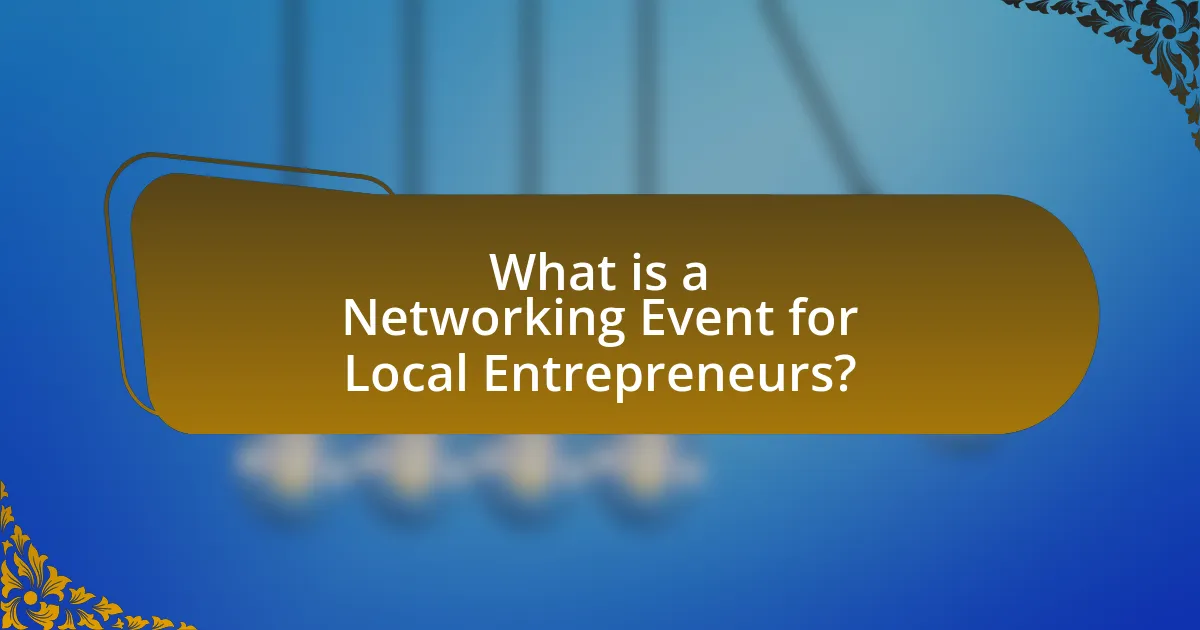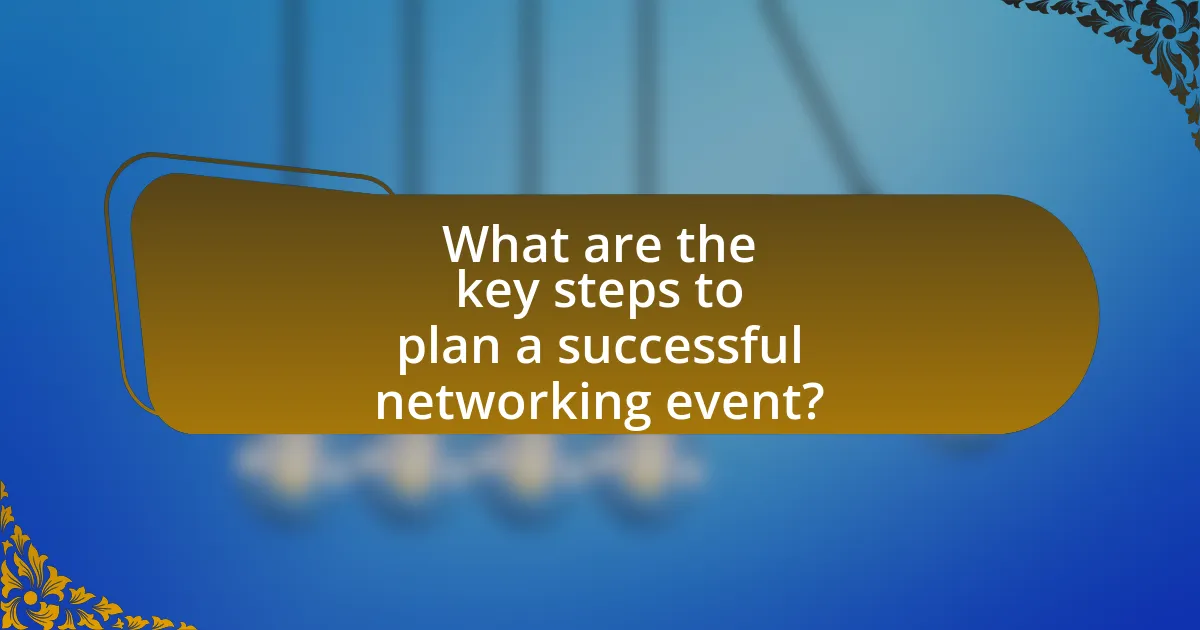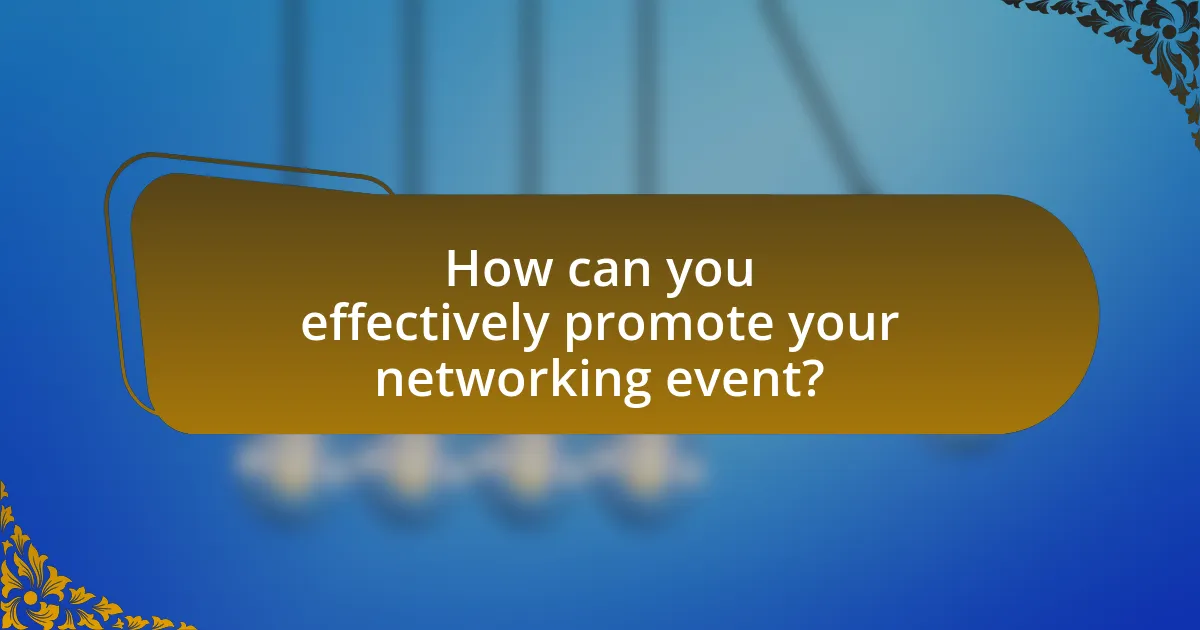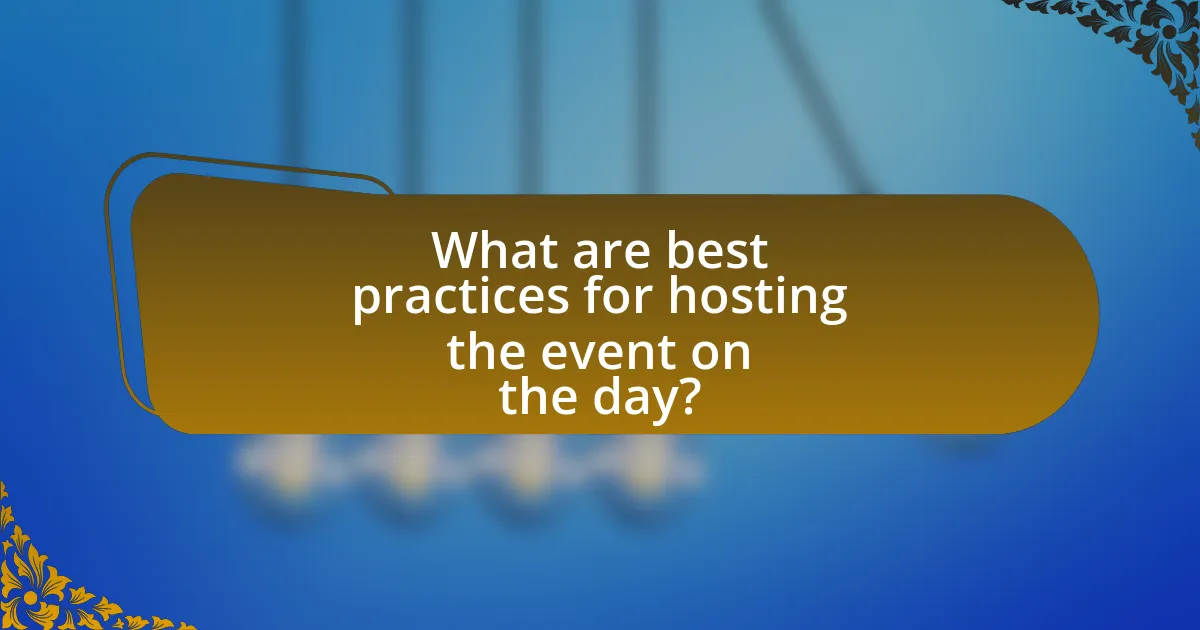The article focuses on how to host a networking event that effectively attracts local entrepreneurs. It outlines the significance of networking events in fostering connections, collaboration, and business growth within the local entrepreneurial community. Key topics include the benefits of networking for entrepreneurs, strategies for planning and promoting successful events, logistical considerations, and best practices for engaging participants. Additionally, the article addresses common challenges faced during event hosting and offers practical tips for enhancing the networking experience, ensuring that attendees can build meaningful professional relationships.

What is a Networking Event for Local Entrepreneurs?
A networking event for local entrepreneurs is a gathering designed to facilitate connections, collaboration, and business opportunities among individuals who own or operate businesses within a specific geographic area. These events typically include activities such as presentations, discussions, and informal interactions that encourage participants to share ideas, resources, and experiences. According to a study by the Kauffman Foundation, networking is crucial for entrepreneurs as it can lead to increased access to funding, mentorship, and partnerships, which are essential for business growth and sustainability.
How do networking events benefit local entrepreneurs?
Networking events benefit local entrepreneurs by providing opportunities for collaboration, resource sharing, and business growth. These events facilitate connections among entrepreneurs, allowing them to exchange ideas, seek mentorship, and form partnerships that can lead to new ventures. According to a study by the Kauffman Foundation, 70% of entrepreneurs reported that networking significantly contributed to their business success, highlighting the importance of building relationships within the local business community.
What opportunities do networking events provide for entrepreneurs?
Networking events provide entrepreneurs with valuable opportunities to connect with potential clients, partners, and investors. These events facilitate relationship-building, allowing entrepreneurs to expand their professional networks and gain insights from industry peers. According to a study by the Harvard Business Review, 70% of jobs are found through networking, highlighting the importance of these connections for business growth. Additionally, networking events often feature speakers and workshops that provide entrepreneurs with knowledge and skills relevant to their industries, further enhancing their business acumen.
How can networking events enhance collaboration among local businesses?
Networking events enhance collaboration among local businesses by providing a platform for direct interaction, idea exchange, and relationship building. These events facilitate connections that can lead to partnerships, joint ventures, and resource sharing, which are essential for business growth. For instance, a study by the Kauffman Foundation found that 70% of entrepreneurs credit networking as a key factor in their success, highlighting the importance of these interactions in fostering collaborative opportunities.
Why is hosting a networking event important for community growth?
Hosting a networking event is important for community growth because it fosters connections among local entrepreneurs, leading to collaboration and resource sharing. These events create a platform for individuals to exchange ideas, which can stimulate innovation and economic development. According to a study by the Kauffman Foundation, networking is a critical factor in entrepreneurial success, as it enhances access to information and opportunities. By bringing together diverse members of the community, networking events can also strengthen social ties, which are essential for a supportive business environment.
How do networking events contribute to local economic development?
Networking events contribute to local economic development by fostering connections among entrepreneurs, businesses, and community members, which can lead to increased collaboration and innovation. These events create opportunities for knowledge sharing, resource exchange, and partnership formation, ultimately stimulating local business growth. For instance, a study by the Kauffman Foundation found that regions with active networking events experience higher rates of startup formation and job creation, demonstrating a direct link between networking activities and economic vitality.
What role do networking events play in fostering innovation?
Networking events play a crucial role in fostering innovation by facilitating connections among diverse individuals, which leads to the exchange of ideas and collaboration. These events create an environment where entrepreneurs, industry experts, and innovators can share insights, discuss challenges, and brainstorm solutions. Research indicates that 85% of jobs are filled through networking, highlighting the importance of these interactions in generating new opportunities and innovative concepts. Furthermore, a study by the Harvard Business Review found that diverse teams, often formed through networking, are 35% more likely to outperform their peers, underscoring how networking events can catalyze innovative thinking and problem-solving.

What are the key steps to plan a successful networking event?
To plan a successful networking event, first define the event’s purpose and target audience. This clarity ensures that the event meets specific needs and attracts the right participants. Next, select an appropriate venue that accommodates the expected number of attendees and fosters interaction, as studies show that venue choice significantly impacts attendee engagement.
Then, create a detailed agenda that includes time for networking, presentations, and activities that encourage interaction, as structured events have been shown to enhance networking opportunities. Promote the event through various channels, including social media and local business networks, to maximize reach and attendance.
Finally, follow up with attendees post-event to maintain connections and gather feedback, which is crucial for improving future events. Research indicates that effective follow-up can increase the likelihood of ongoing networking relationships.
How do you define the purpose of your networking event?
The purpose of a networking event is to facilitate connections among local entrepreneurs to foster collaboration and business growth. This is achieved by creating an environment where attendees can share ideas, resources, and opportunities. Research indicates that 85% of jobs are filled through networking, highlighting the importance of such events in building professional relationships and expanding business networks.
What specific goals should you set for the event?
Set specific goals for the event such as increasing local entrepreneur attendance by 30%, facilitating at least 50 meaningful connections among attendees, and generating a minimum of 10 collaborative opportunities. These goals provide measurable targets that can enhance the event’s effectiveness. For instance, a study by the Kauffman Foundation indicates that networking events can significantly boost collaboration among entrepreneurs, leading to increased business growth and innovation.
How can you identify your target audience effectively?
To identify your target audience effectively, conduct thorough market research to understand demographics, interests, and behaviors of potential attendees. This involves analyzing data from surveys, social media insights, and industry reports to pinpoint characteristics such as age, profession, and entrepreneurial interests. For instance, a study by the Small Business Administration indicates that 70% of entrepreneurs are between the ages of 30 and 50, highlighting a specific age range to focus on. Additionally, segmenting your audience based on their business sectors can help tailor your event to meet their needs, ensuring higher engagement and attendance.
What logistical considerations should be taken into account?
Key logistical considerations for hosting a networking event include venue selection, catering, technology requirements, and scheduling. Venue selection must accommodate the expected number of attendees and provide a conducive environment for networking. Catering should offer a variety of food and beverage options to cater to diverse dietary preferences, enhancing attendee satisfaction. Technology requirements involve ensuring reliable audio-visual equipment for presentations and Wi-Fi access for participants. Scheduling should consider optimal times for attendance, avoiding conflicts with major local events or holidays to maximize participation. These considerations are essential for creating a successful networking event that effectively attracts local entrepreneurs.
How do you choose the right venue for your networking event?
To choose the right venue for your networking event, assess the location’s accessibility, capacity, and ambiance. A venue should be easily reachable by public transport and have adequate parking to encourage attendance. The space must accommodate the expected number of guests comfortably, allowing for interaction and networking. Additionally, the ambiance should align with the event’s purpose; a professional setting fosters serious discussions, while a casual environment may encourage more relaxed networking. Research indicates that 70% of attendees value venue accessibility, highlighting its importance in event success.
What factors should influence your event’s date and time?
The date and time of your event should be influenced by the availability of your target audience, local events, and seasonal considerations. Target audience availability is crucial; for instance, evenings or weekends may attract more local entrepreneurs who are typically busy during weekdays. Additionally, avoiding conflicts with major local events, such as festivals or conferences, can enhance attendance, as these events may draw potential attendees away. Seasonal considerations also play a role; for example, summer months may see lower attendance due to vacations, while fall may be more favorable for networking events.

How can you effectively promote your networking event?
To effectively promote your networking event, utilize a multi-channel marketing strategy that includes social media, email marketing, and local partnerships. Social media platforms like LinkedIn and Facebook allow you to reach a targeted audience of local entrepreneurs, while email marketing can directly engage your existing contacts and encourage them to invite others. Collaborating with local businesses or organizations can also enhance visibility, as they may share your event with their networks. According to a study by Eventbrite, 80% of event attendees find out about events through social media, highlighting its effectiveness as a promotional tool.
What marketing strategies are most effective for attracting local entrepreneurs?
Effective marketing strategies for attracting local entrepreneurs include targeted social media advertising, community engagement initiatives, and partnerships with local business organizations. Targeted social media advertising allows for precise demographic targeting, ensuring that promotional content reaches entrepreneurs in specific geographic areas. Community engagement initiatives, such as hosting workshops or informational sessions, foster relationships and build trust within the local entrepreneurial ecosystem. Additionally, forming partnerships with local business organizations can enhance credibility and expand outreach, as these organizations often have established networks of entrepreneurs. According to a study by the Small Business Administration, 70% of entrepreneurs prefer to engage with local events that are promoted through community channels, highlighting the importance of localized marketing efforts.
How can social media be leveraged to promote your event?
Social media can be leveraged to promote your event by creating targeted campaigns that engage potential attendees. Utilizing platforms like Facebook, Instagram, and LinkedIn allows for the dissemination of event details, visuals, and updates to a broad audience. For instance, Facebook events can facilitate RSVP tracking and reminders, while Instagram stories can showcase behind-the-scenes content to generate excitement. According to a study by Eventbrite, 95% of event creators believe social media is an effective tool for promoting events, highlighting its importance in reaching local entrepreneurs.
What role do partnerships with local organizations play in promotion?
Partnerships with local organizations play a crucial role in promotion by enhancing visibility and credibility for events. Collaborating with established local entities allows for access to their networks, which can significantly increase attendance and engagement. For instance, a study by the Community Development Society found that events co-hosted with local organizations saw a 40% increase in participant numbers compared to those organized independently. This demonstrates that leveraging local partnerships not only broadens outreach but also fosters trust within the community, making promotional efforts more effective.
How can you create engaging content for your networking event?
To create engaging content for your networking event, focus on interactive formats such as workshops, panel discussions, and Q&A sessions that encourage participation. Research indicates that events incorporating interactive elements can increase attendee engagement by up to 70%, as participants feel more involved and invested in the experience. Additionally, utilizing real-time polls and social media integration can enhance interaction, allowing attendees to share their thoughts and connect with others during the event.
What types of speakers or panelists should you consider inviting?
Consider inviting local entrepreneurs, industry experts, and motivational speakers as panelists or speakers for your networking event. Local entrepreneurs provide relatable insights and experiences that resonate with attendees, fostering a sense of community. Industry experts can offer valuable knowledge and trends relevant to the local market, enhancing the educational aspect of the event. Motivational speakers can inspire and energize the audience, encouraging networking and collaboration. Research indicates that events featuring diverse speakers attract higher attendance and engagement, as they cater to various interests and professional backgrounds.
How can interactive activities enhance participant engagement?
Interactive activities enhance participant engagement by fostering active participation and creating a dynamic environment. When participants are involved in hands-on experiences, they are more likely to connect with others and retain information. Research indicates that interactive methods, such as group discussions or collaborative tasks, can increase engagement levels by up to 70% compared to traditional lecture formats. This heightened engagement leads to improved networking opportunities, as participants feel more comfortable initiating conversations and forming connections.

What are best practices for hosting the event on the day?
Best practices for hosting the event on the day include thorough preparation, effective communication, and proactive engagement with attendees. Ensuring that all logistical elements, such as seating arrangements, technology setup, and materials, are in place before the event starts is crucial for a smooth experience. Effective communication involves clearly outlining the event schedule and objectives to attendees, which fosters a focused environment. Proactive engagement can be achieved by encouraging networking through icebreakers or structured activities, which enhances interaction among local entrepreneurs. These practices are supported by event management studies indicating that well-organized events yield higher participant satisfaction and networking success.
How can you ensure a welcoming atmosphere for attendees?
To ensure a welcoming atmosphere for attendees, create an inclusive environment by greeting each participant warmly upon arrival. This initial interaction sets a positive tone and encourages engagement. Additionally, arrange seating to facilitate conversation, such as using circular or small group setups, which research shows fosters interaction and comfort among attendees. Providing name tags can also help break the ice, as it encourages introductions and personal connections. According to a study by the University of California, social interactions are significantly enhanced in environments where individuals feel recognized and valued, reinforcing the importance of these strategies in creating a welcoming atmosphere.
What strategies can facilitate effective networking during the event?
Effective networking during an event can be facilitated by implementing structured activities such as icebreakers, designated networking sessions, and interactive workshops. Icebreakers encourage attendees to engage with one another, fostering initial connections. Designated networking sessions provide focused time for participants to meet and exchange information, which is crucial for building relationships. Interactive workshops allow attendees to collaborate on tasks, enhancing their interaction and creating a shared experience that can lead to meaningful connections. Research indicates that structured networking activities significantly increase the likelihood of attendees forming valuable professional relationships, as they create an environment conducive to interaction and collaboration.
How do you manage time effectively during the event?
To manage time effectively during the event, establish a detailed schedule that outlines each segment’s duration and objectives. This structured approach ensures that all activities, such as networking sessions, presentations, and breaks, are allocated specific time slots, allowing for smooth transitions and adherence to the overall timeline. Research indicates that events with clear agendas are 30% more likely to stay on schedule, enhancing participant satisfaction and engagement.
What follow-up actions should be taken after the event?
After the event, the primary follow-up action is to send personalized thank-you emails to all attendees, which fosters goodwill and encourages future engagement. This action is crucial as it acknowledges participants’ contributions and reinforces relationships built during the event. Additionally, sharing a summary of the event, including key takeaways and any resources mentioned, can provide value to attendees and keep the conversation going. Research indicates that effective follow-up can increase the likelihood of future collaborations, as 70% of networking success is attributed to maintaining connections post-event.
How can you gather feedback from participants to improve future events?
To gather feedback from participants to improve future events, utilize post-event surveys and direct interviews. Post-event surveys can be distributed via email or through event management platforms, allowing participants to provide structured feedback on various aspects such as content, organization, and networking opportunities. Research indicates that 70% of event organizers who implement surveys see improved attendee satisfaction in subsequent events. Additionally, conducting direct interviews with a select group of participants can yield in-depth insights and qualitative data that surveys may not capture. This combination of quantitative and qualitative feedback ensures a comprehensive understanding of participant experiences, leading to more effective improvements for future events.
What methods can be used to maintain connections established during the event?
To maintain connections established during the event, follow-up communication is essential. This can be achieved through personalized emails or messages that reference specific conversations or shared interests from the event, reinforcing the connection. Additionally, creating a dedicated online group or forum for attendees encourages ongoing interaction and collaboration. Research indicates that consistent engagement, such as sharing relevant resources or organizing follow-up meetups, significantly enhances relationship longevity. For instance, a study by the Harvard Business Review found that maintaining regular contact can increase the likelihood of future collaborations by up to 70%.
What are some common challenges when hosting networking events?
Common challenges when hosting networking events include attracting the right audience, managing logistics, and ensuring meaningful interactions. Attracting the right audience is crucial, as a mismatch can lead to low engagement; for instance, events that fail to target specific demographics often see reduced participation rates. Managing logistics involves coordinating venue selection, catering, and technology, which can overwhelm organizers if not planned meticulously. Ensuring meaningful interactions is essential, as superficial networking can diminish the event’s value; studies show that structured activities, such as icebreakers, can enhance engagement and foster deeper connections among attendees.
How can you address low attendance rates?
To address low attendance rates at networking events, organizers should implement targeted marketing strategies that resonate with local entrepreneurs. Utilizing social media platforms, email campaigns, and community partnerships can effectively raise awareness and interest. For instance, a study by Eventbrite found that events promoted through social media channels saw a 30% increase in attendance compared to those that relied solely on traditional marketing methods. Additionally, offering incentives such as early bird registration discounts or exclusive networking opportunities can further encourage participation.
What strategies can help manage difficult participants?
To manage difficult participants effectively, establish clear guidelines and expectations at the beginning of the event. This proactive approach helps participants understand acceptable behavior and fosters a respectful environment. Additionally, actively listen to their concerns and address them promptly, which can de-escalate tensions and demonstrate that their input is valued. Implementing structured activities can also minimize disruptions by keeping participants engaged and focused on the event’s objectives. Research indicates that clear communication and structured environments significantly reduce conflicts in group settings, enhancing overall participant satisfaction.
What practical tips can enhance your networking event experience?
To enhance your networking event experience, actively engage with attendees by initiating conversations and asking open-ended questions. This approach fosters meaningful connections and encourages dialogue, which is essential for effective networking. Research indicates that individuals who engage in conversations are more likely to establish valuable relationships; for instance, a study by the Harvard Business Review found that networking is most effective when participants focus on building rapport rather than merely exchanging business cards. Additionally, preparing an elevator pitch can help succinctly convey your professional background and interests, making it easier for others to remember you.
